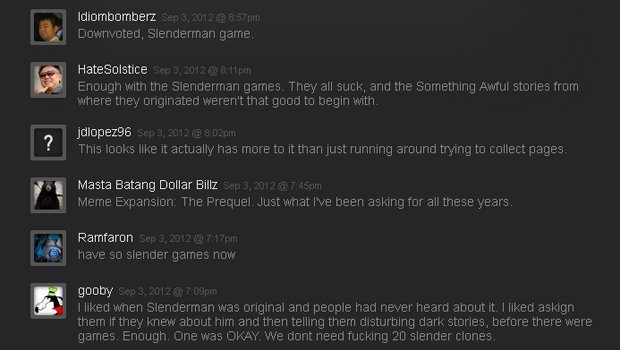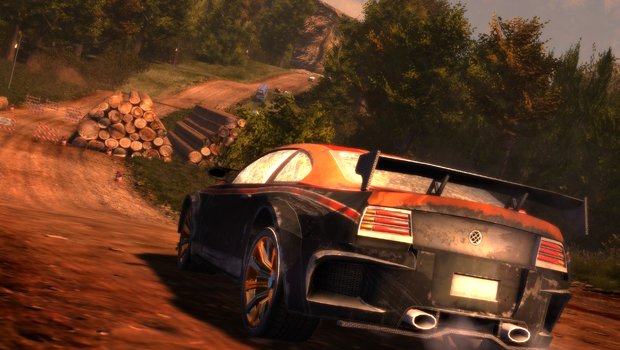Steam Greenlight: Why the $100 buy-in charge is just an expensive cherry on an already slightly messy problem cake
Valve's utopian crowd-sourced submissions system isn't quite set to to deliver on it's promise yet
Valve has announced a tweak to its Steam Greenlight service, the system intended to democratise Steam’s submissions process by allowing users to vote on which projects make it to the publishing stage. That tweak? A $100 submission fee.
The new policy, rather than being some manner of eldritch Victorian indie tax to swell Valve’s coffers by feeding on the blood of little-guy developers, is apparently a deterrent against the abuse the Greenlight system has seen from joke and troll submitters since launch. And the money doesn’t even go to Valve, instead being donated to the Child’s Play charity. That’s fine in principle. The inherent point of Greenlight is to allow promising talent to rise majestically to the surface, so anything that stops the misanthropic holidaying redneck gobshites at the side of the pond from throwing in tyres and drunkenly firing air-rifles at the ducks is something I can get behind.
In principle.

And the system will work. A forced $100 investment in one's joke submission will ensure that any prospective troll will either a) make sure that their fictional ‘Penis Hammer 17: The Cockening’ pitch is really, really funny, or else b) not bother. But I can’t help but worry that the system is akin to using a shotgun to open a particularly sticky jam jar lid. Moreover, it typifies what seems to me a holistic clumsiness that has plagued the implementation of Greenlight overall. But I skip haphazardly ahead of myself. First, the case of the sugary exit wound and the delicious strawberry spatter-pattern analysis.
$100 (or around £60 in the money of the tea-sipping motherland) is not a vast sum in the great scheme of things. To a burgeoning indie games studio, it could quite easily be seen as just one of the many niggly little costs that any new company’s stumbly newborn deer period must absorb. An investment in future success if you will, and one that no-one will even remember in the years to come, except to scoff at smugly while gesturing for a slave-child to ignite a fifty to light their cigars with as they float merrily around their brandy-filled swimming pool. But the thing is, not everyone is in a position to absorb $100 into an already-accepted start-up budget. Because not every great new game idea comes from someone with any kind of a budget.
Above: Prince of Persia spawned some of the best games of the last couple of generations and an oily-chested Jake Gyllenhaal blockbuster. But it started with two boys twatting around with sheets at home
Dating right back to the ‘80s, some of the best games have come from one man with an idea, coding away on his home computer in his bedroom in his spare time. Some brilliant, historically important games – whole companies, even - have started with one guy, a crazy notion, and many long experimental hours spent burning through his evenings in front of a monitor.
Weekly digests, tales from the communities you love, and more
Those guys are surely the people something like Greenlight can theoretically be most useful to. Those are the guys who can best benefit from an instant impression of whether their untested experimental idea is cool or not. Those are the guys whose inexperience in systems and aesthetic design can be immediately off-set by a vast focus group of players throwing in pointers from the prototype stage. But those uncertain tinkering experimenters are also the folk least likely to want to commit $100 to an uncertain process they’re only just getting into. It maybe doesn’t sound a lot for a potential key to the lucrative Steam sales party, but for micro-devs juggling the perils of day-to-day survival with trying to get their game made, such as Dames Making Games founder Zoe Quinn, “That's eating for a month”.

Above: Food. Important
And that’s assuming that Greenlight even works as intended of course. But now you also have to layer in all of the other elements that I’m uneasy about. Like the fact that its structure currently makes it feel like less of a creative workshop-cum-talent promotion service and more like a TV talent show, albeit one in which the participants have to pay to be judged on sight before they’ve even sung a note.
The glaring error of a downvote button alone fills me with visions of vested-interest abuse and the uneducated knee-jerk burying of certain projects. You only need to look at the argument that’s already broken out in the comments section for Slenderman Stories: The Orphanage for an early superficial example. A quick click over there reveals a whole groundswell of instinctive condemnation for any Slenderman-related project, rife with accusations of tiredness and idea-theft based on the barest whisps of gameplay description, despite the public-domain Slender mythos having been invented as part of a crowd-sourced online community horror project in the first place.

Now consider how easily the internet can and does group together to e-bully someone down over a tangentially related beef, and how often up and down-voting systems are abused as a result of personal and professional bias. You’ve got the potential for political derailment at every turn if the wrong people get organised.
Of course Steam isn’t the only online marketplace charging for exposure. There are buy-in costs for Apple’s App Store of course, as well as the likes of Xbox Live and the PSN. But there’s a key difference. The development license costs there pay for a direct line to the real submission evaluation process. In Greenlight, your $100 is basically a really expensive lottery ticket, buying you a chance to be judged by a community who – at the time of writing at least – stumble across submissions through a system which leaves a lot to be desired in terms of search and filtering.
And then if you’re really lucky, and your game does attain the currently ill-defined approval requirements, then it will be passed up to Valve for its real judgement. And then there’s every chance it will be turned down anyway. Valve’s own approval criteria for Steam are a bit inconsistent, to say the very least.

Above: Flatout 3. One of the worst things to happen to humanity. Got accepted onto Steam. Plenty of good games don't
Yes, there’s every chance that I’m over-romanticising the plight of the bedroom developer here, looking upon it through the same eye-misting idiot-tunnel through which I view everything related to the Amiga and the Spectrum. And yes, I’m fully aware that if you don’t have faith in your game's ability to sell $100 worth of copies then there’s a chance it shouldn’t be on Steam anyway. But the assumption that every Greenlight fee will be made back in sales is one hell of an inaccurate assumption when you factor in everything at play here. When you consider what developers are really getting for their $100 (ie. not a lot really, given that decent Greenlight support will probably still require the sort of grass-roots promotion that a smart Steam-courting indie would cultivate for their game anyway), that throwaway nominal fee suddenly becomes a whole lot heftier.
Don't get me wrong. In principle Greenlight is a definite improvement over the curtained-off arcanery of Valve's traditional submission process. But it currently feels in need of a good deal more ironing out before it's really ready to achieve its theoretical purpose. The quick addition of the admission fee does at least prove that Valve is willing to be dynamic and adaptable in honing the system though, which can only be a good thing. But I personally can't help feeling that the necessary honing has only just begun.
You know that kid at parties who talks too much? Drink in hand, way too enthusiastic, ponderously well-educated in topics no one in their right mind should know about? Loud? Well, that kid’s occasionally us. GR Editorials is a semi-regular feature where we share our informed insights on the news at hand. Sharp, funny, and finger-on-the-pulse, it’s the information you need to know even when you don’t know you need it.



